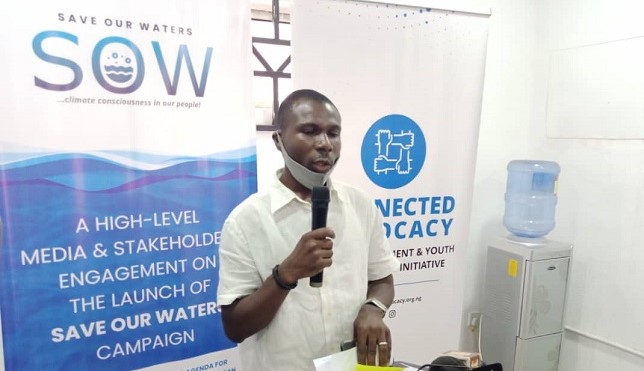A non-governmental organisation (NGO), Connected Advocacy for Empowerment and Youth Development Initiative, has urged the President Muhammadu Buhari to implement policies geared towards the preservation and protection of Nigeria waters from marine litter.

According to the group, marine litter crisis is a call for concern, saying its sources and causes have a direct impact on the environment, as well as the people’s health and safety.
This, according to the group’s officials, is due to slow rate of degradation of most marine litter items, which is mainly plastics and other biodegradables, adding that, if not properly checked, would become a disaster for Nigeria in particular and the continent in general.
Speaking in Benin City, Edo State, during the launch of #SaveOurWaters in commemoration of the 2021 World Water Day, with the theme “Implementation of 30×30 Agenda for Sustainable Environment and Blue Ocean Economy Towards Improving Value for Water”, the Executive Director of Connected Advocacy, Prince Israel Orekha, said the dumping of used household and industrial items was threatening the oceans and livelihoods; and could be catastrophic to local communities, while endangering the implementation of SDGs 12, 13 and 14 in Nigeria.
He said: “The ocean covers 70% of the earth’s surface, holding 97% of all water and 80% of all life forms. Major ocean sectors such as tourism, shipping, fishing, aquaculture and marine renewable energy collectively contribute to a ‘blue’ economy, estimated at a global gross value added of $1.5trn in 2010. This is projected to double in size to $3trn by 2030, with some ocean industries set to grow faster than the global economy.
“However, ocean health is under existential threat. Faced with the triple crises of pollution, nature loss and climate change, two-thirds of our oceans have been negatively altered by human activity; leaving industries, businesses and livelihoods exposed. With existing financing still largely directed towards unsustainable sectors and activities, it is critical that all sectors of the blue economy are rapidly transitioned towards sustainable pathways.
“The Save Our Waters Campaign will continue to advocate for policy makers to enforce treaties, individuals and industries to have a change of mindset from seeing our waters as a dumping site for waste, to ensure valuing for our waters, and sustainable investment for our ocean’s health, indigenous people and local communities.
“We therefore call on the Federal Government of Nigeria and other African leaders to strengthen laws that prevent industries and individuals from dumping trash into our waters, to promote save our waters campaign, to enhance value for waters and implement the adoption 30×30 agenda; also to work on capacity building to help our regional, national and sub-national governments to enforce marine treaties.
“The deficiencies in the implementation and enforcement of existing international, regional, national regulations and standards that could improve the situation, combined with a lack of awareness among main stakeholders and the general public, are other major reasons why the marine litter problem not only remains, but continues to increase in our continent, Furthermore, marine litter is part of the broader problem of waste management, which is becoming a major public health and environmental concern in many countries today,” Prince Orekha said.
Representatives from media, NEMA, Edo State Ministry of Water and Natural Resources, as well as Health of Mother Earth Foundation (HOMEF) took turns out to speak on their efforts in ensuring Nigeria water bodies are safe.
By Isaac Eranga
